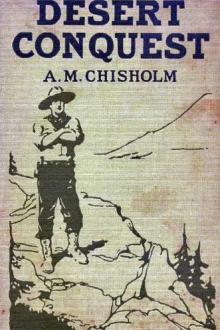Cabin Fever by B. M. Bower (bill gates book recommendations .txt) 📕

Read free book «Cabin Fever by B. M. Bower (bill gates book recommendations .txt) 📕» - read online or download for free at americanlibrarybooks.com
- Author: B. M. Bower
Read book online «Cabin Fever by B. M. Bower (bill gates book recommendations .txt) 📕». Author - B. M. Bower
Marie did not go near the river at first. Some instinct of dread made her shun even the possibility that Lovin Child had headed that way. But a man told her, when she broke down her diffidence and inquired, that he had seen a little tot in a red suit and cap going off that way. He had not thought anything of it. He was a stranger himself, he said, and he supposed the kid belonged there, maybe.
Marie flew to the river, the man running beside her, and three or four others coming out of buildings to see what was the matter. She did not find Lovin Child, but she did find half of the cracker she had given him. It was lying so close to a deep, swirly place under the bank that Marie gave a scream when she saw it, and the man caught her by the arm for fear she meant to jump in.
Thereafter, the whole of Alpine turned out and searched the river bank as far down as they could get into the box canyon through which it roared to the sage-covered hills beyond. No one doubted that Lovin Child had been swept away in that tearing, rock-churned current. No one had any hope of finding his body, though they searched just as diligently as if they were certain.
Marie walked the bank all that day, calling and crying and fighting off despair. She walked the floor of her little room all night, the door locked against sympathy that seemed to her nothing but a prying curiosity over her torment, fighting back the hysterical cries that kept struggling for outlet.
The next day she was too exhausted to do anything more than climb up the steps of the train when it stopped there. Towns and ranches on the river below had been warned by wire and telephone and a dozen officious citizens of Alpine assured her over and over that she would be notified at once if anything was discovered; meaning, of course, the body of her child. She did not talk. Beyond telling the station agent her name, and that she was going to stay in Sacramento until she heard something, she shrank behind her silence and would reveal nothing of her errand there in Alpine, nothing whatever concerning herself. Mrs. Marie Moore, General Delivery, Sacramento, was all that Alpine learned of her.
It is not surprising then, that the subject was talked out long before Bud or Cash came down into the town more than two months later. It is not surprising, either, that no one thought to look up-stream for the baby, or that they failed to consider any possible fate for him save drowning. That nibbled piece of cracker on the very edge of the river threw them all off in their reasoning. They took it for granted that the baby had fallen into the river at the place where they found the cracker. If he had done so, he would have been swept away instantly. No one could look at the river and doubt that—therefore no one did doubt it. That a squaw should find him sitting down where he had fallen, two hundred yards above the town and in the edge of the thick timber, never entered their minds at all. That she should pick him up with the intention at first of stopping his crying, and should yield to the temptingness of him just as Bud had yielded, would have seemed to Alpine still more unlikely; because no Indian had ever kidnapped a white child in that neighborhood. So much for the habit of thinking along grooves established by precedent
Marie went to Sacramento merely because that was the closest town of any size, where she could wait for the news she dreaded to receive yet must receive before she could even begin to face her tragedy. She did not want to find Bud now. She shrank from any thought of him. Only for him, she would still have her Lovin Child. Illogically she blamed Bud for what had happened. He had caused her one more great heartache, and she hoped never to see him again or to hear his name spoken.
Dully she settled down in a cheap, semi-private boarding house to wait. In a day or two she pulled herself together and went out to look for work, because she must have money to live on. Go home to her mother she would not. Nor did she write to her. There, too, her great hurt had flung some of the blame. If her mother had not interfered and found fault all the time with Bud, they would be living together now—happy. It was her mother who had really brought about their separation. Her mother would nag at her now for going after Bud, would say that she deserved to lose her baby as a punishment for letting go her pride and self-respect. No, she certainly did not want to see her mother, or any one else she had ever known. Bud least of all.
She found work without much trouble, for she was neat and efficient looking, of the type that seems to belong in a well-ordered office, behind a typewriter desk near a window where the sun shines in. The place did not require much concentration—a dentist's office, where her chief duties consisted of opening the daily budget of circulars, sending out monthly bills, and telling pained-looking callers that the doctor was out just then. Her salary just about paid her board, with a dollar or two left over for headache tablets and a vaudeville show now and then. She did not need much spending money, for her evenings were spent mostly in crying over certain small garments and a canton-flannel dog called “Wooh-wooh.”
For three months she stayed, too apathetic to seek a better position. Then the dentist's creditors became suddenly impatient, and the dentist could not pay his office rent, much less his office girl. Wherefore Marie found herself looking for work again, just when spring was opening all the fruit blossoms and merchants were smilingly telling one another that business was picking up.
Weinstock-Lubin's big department store gave her desk space in the mail-order department. Marie's duty it was to open the mail, check up the orders, and see that enough money was sent, and start the wheels moving to fill each order—to the satisfaction of the customer if possible.
At first the work worried her a little. But she became accustomed to it, and settled into the routine of passing the orders along the proper channels with as little individual thought given to each one as was compatible with efficiency. She became acquainted with some of the girls, and changed to a better boarding house. She still cried over the wooh-wooh and the little garments, but she did not cry so often, nor did she buy so many headache tablets. She was learning the futility of grief and the wisdom of turning her back upon sorrow when she could. The sight of a two-year-old baby boy would still bring tears to her eyes, and she could not sit through a picture show that had scenes of children and happy married couples, but she fought the pain of it as a weakness which she must overcome. Her Lovin Child was gone; she had given up everything but the sweet, poignant memory of how pretty he had been and how endearing.
Then, one morning in early June, her practiced fingers were going through the pile of mail orders and they singled out one that carried the postmark of Alpine. Marie bit her lips, but her fingers did not falter in their task. Cheap table linen, cheap collars, cheap suits or cheap something-or-other was wanted, she had no doubt. She took out the paper with the blue money order folded inside, speared the money order on the hook with others, drew her order pad closer, and began to go through





Comments (0)